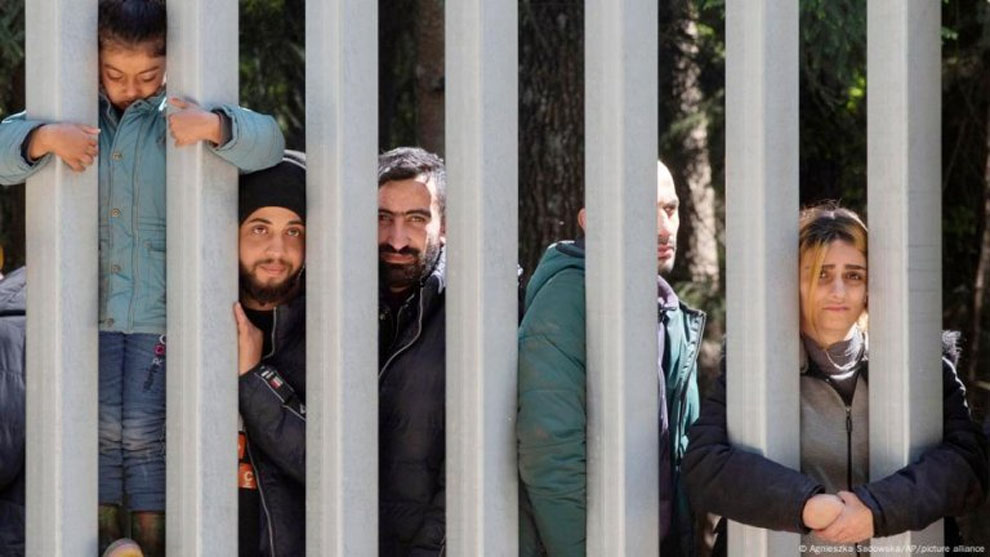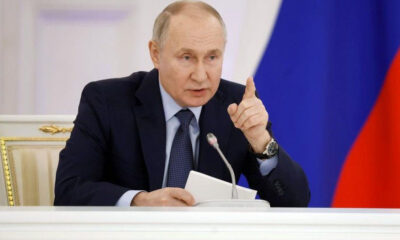International
Rockets strike Ukraine’s Lviv as Biden says Putin ‘cannot remain in power’

U.S. President Joe Biden described Russian leader Vladimir Putin as a butcher who “cannot remain in power” after meeting Ukrainian refugees in Poland, as Kremlin forces stepped up attacks across Ukraine, including the western city of Lviv.
Biden’s comments, an escalation of U.S. rhetoric towards Moscow over its invasion of Ukraine, were not a call for regime change in Russia, a White House official said later, but meant to prepare the world’s democracies for an extended conflict.
Just before he spoke outside Warsaw’s castle on Saturday, four missiles hit the outskirts of Lviv, just 60 km (40 miles) from the Polish border, local officials said.
Another strike significantly damaged Lviv’s infrastructure but caused no reported deaths.
As the fight since Russia’s Feb. 24 invasion of its neighbour drags on, a visibly irritated Ukrainian President Volodymyr Zelenskiy again demanded Western nations send military hardware.
He asked whether they were intimidated by Moscow, saying, “We’ve already been waiting 31 days.”
Biden, in a fiery speech ending a European trip aimed at bolstering Western resolve, framed the war as part of a historic struggle for democratic freedoms.
“For God’s sake, this man cannot remain in power,” Biden said. The Kremlin dismissed the comment, saying it was “not for Biden to decide”.
Biden, after meeting refugees in Poland, called Putin a “butcher”.
“We need to be clear-eyed. This battle will not be won in days or months,” he said. “We need to steel ourselves for a long fight ahead.”
Moscow says the goals for what Putin calls a “special military operation” include demilitarizing and “denazifying” its neighbour. Ukraine and its Western allies calls this a pretext for an unprovoked invasion.
Russia has failed to seize any major Ukrainian city and the conflict has killed thousands of people, sent nearly 3.8 million abroad and driven more than half of Ukraine’s children from their homes, according to the United Nations.
READ ALSO:
- BREAKING: Troops uncover wreckage of Alpha Jet aircraft mssing since March 2021
- APC Convention: Security agents arrest three pickpockets
- Police Gun Down Four Bandits In Benue
FIGHTING, BOMBING NATIONWIDE
Western intelligence officials say Russian forces now rely on indiscriminate bombardments rather than risking large-scale ground operations, a tactic that could limit Russian military casualties but would harm more civilians.
Russian forces seized Slavutych, a town where workers at the defunct Chernobyl nuclear plant live, and the mayor said three people were killed, Interfax Ukraine news agency said.
Ukrainian staff have continued to work at Chernobyl after the site of the world’s worst nuclear accident was seized by Russian forces. The International Atomic Energy Agency has expressed alarm about the situation.
Russian forces fired at a nuclear research facility in Kharkiv, Ukraine’s parliament said.
In the encircled southern port of Mariupol, Mayor Vadym Boichenko said the situation remained critical, with street fighting in the centre. Mariupol has been devastated by weeks of Russian fire.
Reuters could not independently verify the accounts of fighting throughout Ukraine.
UKRAINE WAITS
The United States, which has pledged billions in aid, promised an additional $100 million for field gear and civilian security assistance for Ukraine’s border guard and police.
Zelenskiy compared Mariupol’s devastation to the destruction inflicted on the Syrian city of Aleppo by Syrian and Russian forces in Syria’s civil war.
He warned of dire consequence if Ukraine – one of the world’s major grain producers – could not export its foodstuffs and urged energy-producing countries to boost output so Russia cannot use its oil and gas wealth to “blackmail” other nations.
The U.N. has confirmed 1,104 civilian deaths and 1,754 injuries in Ukraine and says the real toll is likely higher. Ukraine says 136 children have been killed.
Russia’s defence ministry said 1,351 Russian soldiers had been killed and 3,825 wounded, the Interfax news agency reported on Friday. Ukraine says 15,000 Russian soldiers have been killed. Reuters could not independently verify the claims.
Reuters
International
$100m coin collection buried for decades to be auctioned

$100m coin collection buried for decades to be auctioned
A coin collection, much of which remained buried underground for over 50 years, is expected to surpass $100 million at auction, according to experts.
Named the Traveller Collection, this extraordinary assemblage is believed to be the most valuable coin collection ever brought to auction.
The coins will be sold gradually over the next three years, with the first auction set for May 20.
Beyond its immense value, the collection’s origins make for a fascinating tale.
Spanning over 100 territories and encompassing coins from ancient times to the modern era, the collection is being auctioned by Numismatica Ars Classica.
What sets it apart is that most of the coins remained hidden underground for half a century before resurfacing.
According to a press release shared with CNN, the anonymous collector behind the collection began acquiring gold coins after the Wall Street Crash of 1929.
Over time, he developed “a taste for coins with great historical interest, beauty and rarity” and eventually amassed approximately 15,000 coins.
During the 1930s, he and his wife traveled extensively across the Americas and Europe, acquiring rare and historically significant coins while meticulously documenting their purchases.
READ ALSO:
- EFCC re-arraigns son of ex-PDP chairman for alleged N2.2bn oil subsidy fraud
- Group says Natasha’s recall will deepen democracy
- We welcome Gov Makinde’s U-turn on Shari’ah panel – MURIC
Despite settling in Europe at a time when Hitler’s Nazi party loomed over the continent, the collector sensed the impending danger. In response, he carefully packed the coins into cigar boxes, which were then placed inside aluminum containers and buried underground, where they remained undisturbed for five decades.
Among the collection is a 50 Toman coin, part of an “exceedingly rare” set minted in Tehran and Isfahan during the late 18th and early 19th centuries.
International
AI will replace doctors, teachers, others in 10 years – Bill Gates

AI will replace doctors, teachers, others in 10 years – Bill Gates
Bill Gates, a co-founder of Microsoft, has claimed that improvements in artificial intelligence (AI) over the next decade may render humans superfluous for the majority of work.
In a recent interview with comedian Jimmy Fallon on NBC’s The Tonight Show in February, the billionaire philanthropist discussed how AI may take over many facets of life and business.
Gates remarked that expertise is currently “rare”, emphasising the continuous reliance on human specialists in industries such as medicine and education.
For example, we continue to rely on highly trained individuals, such as “a great doctor” or “a great teacher”, whose knowledge cannot be simply replaced by AI.
However, “with AI, over the next decade, that will become free, commonplace — great medical advice, great tutoring,” Gates said.
READ ALSO:
- Senate seeks FG’s immediate intervention to slash data prices
- Reno Omokri: Nigeria gives more opportunities than US, Britain, Canada
- Driver remanded for causing Osun varsity students’ death
In other words, Gates believes that the world is entering a new era of “free intelligence”, as he described in a recent interview with Harvard University professor and happiness specialist Arthur Brooks.
According to Gates, this transition will result in rapid breakthroughs in AI-powered technology, making them more accessible and affecting almost every part of our lives.
These breakthroughs will vary from more effective treatments and diagnoses to widely available AI instructors and virtual assistants.
“It’s very profound and even a little bit scary — because it’s happening very quickly, and there is no upper bound,” Gates told Brooks.
The discussion of how humans will fit into an AI-powered future continues.
Some analysts suggest that artificial intelligence will improve human productivity rather than completely replacing labour, hence driving economic growth and creating new jobs.
However, Microsoft AI CEO Mustafa Suleyman cautions that technological improvements in the coming years will disrupt the nature of most occupations across nearly all industries, potentially exerting a “hugely destabilising” influence on the workforce.
AI will replace doctors, teachers, others in 10 years – Bill Gates
International
Poland suspends migrants’ right to apply for asylum

Poland suspends migrants’ right to apply for asylum
Poland has temporarily suspended the right of migrants arriving in Poland via its border with Belarus to apply for asylum.
Prime Minister Donald Tusk announced it would be happening after the controversial bill, which will allow Polish authorities to suspend this right for up to 60 days at a time, was signed into law by President Andrzej Duda.
Tusk had said it would be adopted “without a moment’s delay” while Duda said the changes were needed to strengthen security on the country’s borders.
But the law has been criticized by rights groups including Human Rights Watch, which said the EU should take legal action against Poland if it was implemented.
The group urged the country’s parliament last month to reject the bill, saying it “flies in the face of Poland’s international and EU obligations” and could “effectively completely seal off the Poland-Belarus border, where Polish authorities already engage in unlawful and abusive pushbacks”.
READ ALSO:
- Trump slaps 25% tariffs on car imports to US
- Reps pass bill to strip Vice President, governors, deputies of immunity
- Businessman collapses in court during trial over $578,000 cash seizure
The government said previously the suspension would only be applied temporarily to people who pose a threat to state security, for example large groups of aggressive migrants trying to storm the border.
Exemptions will be made for unaccompanied minors, pregnant women, the elderly or unwell, anyone exposed to “real risk of serious harm” by being returned and citizens of countries accused of conducting the instrumentalization of migration – like Belarus
Tusk has dismissed criticism from human rights groups.
“Nobody is talking about violating human rights, the right to asylum, we are talking about not granting applications to people who illegally cross the border in groups organised by Lukashenko,” he said in October.
Since 2021, Poland, Lithuania, Latvia and Finland have seen a huge increase in the number of people crossing into their countries illegally from Belarus and Russia.
Polish authorities have sent thousands of troops and border guards to police its border with Belarus and built a 5.5-metre-high steel fence along 186 km of the frontier where at times several thousand migrants have been left stranded.
Rights groups estimate more than one hundred people have died on the borders between Belarus and Poland, Lithuania and Latvia since 2021.
EU eastern flank countries and the European Commission have accused the Belarusian and Russian authorities of weaponising migration to create a new route into the EU to destabilize the bloc.
Poland suspends migrants’ right to apply for asylum
BBC
-

 metro2 days ago
metro2 days agoRivers administrator Ibas fires Fubara’s political appointees
-

 metro2 days ago
metro2 days agoJUST-IN: Ex-Oyo gov Ajimobi’s first child Bisola dies At 42
-

 metro3 days ago
metro3 days agoHow ritualists, native doctor drugged, murdered underage sisters in PH – Police
-

 metro2 days ago
metro2 days agoFG declares public holidays for Eid-el-Fitr
-

 metro1 day ago
metro1 day agoEFCC re-arraigns son of ex-PDP chairman for alleged N2.2bn oil subsidy fraud
-

 Africa2 days ago
Africa2 days agoNiger coup leader sworn in as president for five years
-

 metro2 days ago
metro2 days agoNatasha: Murray-Bruce slams Atiku, defends Akpabio
-

 International2 days ago
International2 days agoAI will replace doctors, teachers, others in 10 years – Bill Gates













